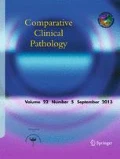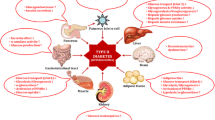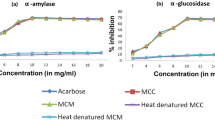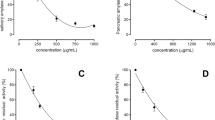Abstract
Overweight, obesity, and diabetes are the most common disorders in the world. In most diets, carbohydrates are the greatest source of calories. Inhibition of carbohydrate digestion or absorption can decrease calorie intake to promote weight loss and combat obesity. It is also a mechanism for reducing hyperglycemia in diabetic subjects. Before being absorbed by the body, carbohydrates must be broken down into monosaccharides. α-Amylase catalyzes the hydrolysis of α-(1,4)-d-glycosidic linkages of starch and other glucose polymers. Inhibitors of this enzyme can be used in treatment of obesity and diabetes. In diabetic patients, inhibition of α-amylase leads to prohibition starch breaking and results in lower levels of blood glucose. The effects of pseudosaccharides, proteinaceous, and polyphenolic inhibitors have been previously reported. Polyphenolic compounds are widely distributed in plants and fruits and are present in normal diets. These compounds have been shown to possess beneficial effects in diabetes, cardiovascular diseases, atherosclerosis, allergy, inflammation, and osteoporosis. Among polyphenolic compounds, flavonoids are of particular significance: They have been shown to reduce cholesterol synthesis via direct action on HMG-CoA reductase and hydrolyze lipids via inhibition of phosphodiesterase (PDE) and diminution of cAMP breakdown. In recent years, many lines of research have been done on those plants which are being used traditionally as drug plants, and their effects have been surveyed on weight loss and control of blood glucose levels in diabetic patients. In this review, we want to investigate α-amylase inhibitors especially human pancreatic α-amylase (HPA)




Similar content being viewed by others
References
Abeysekara W, Chandrasekara A, Liyanage P (2007) Amylase and glucosidase enzyme inhibitory activity of ginger (Zingiber officinale Roscoe) an in vitro study. Trop Agr Res 19:128–135
Ajaya Kumar R, Sridevi K, Vijaya Kumar N, Nanduri S, Rajagopal S (2004) Anticancer and immunostimulatory compounds from Andrographis paniculata. J Ethnopharmacol 92(2–3):291–295
Alberton EH, Damazio RG, Cazarolli LH, Chiaradia LD, Leal PC (2008) Influence of chalcone analogues on serum glucose levels in hyperglycemic rats. Chem Biol Interact 171(3):355–362
Ali H, Houghton P, Soumyanath A (2006) alpha-Amylase inhibitory activity of some Malaysian plants used to treat diabetes; with particular reference to Phyllanthus amarus. J Ethnopharmacol 107(3):449–455
Amessis N, Madani K (2014) Antioxidant capacity and phenolic contents of some Mediterranean medicinal plants and their potential role in the inhibition of cyclooxygenase-1 and acetylcholinesterase activities. Ind Crop Prod 53:6–15
Anderson RA, Broadhurst CL, Polansky MM, Schmidt WF, Khan A (2004) Isolation and characterization of polyphenol type-A polymers from cinnamon with insulin-like biological activity. J Agric Food Chem 52(1):65–70
Anitha M, Daffodil ED, Muthukumarasamy S, Mohan VR (2012) Hepatoprotective and antioxidant activity of ethanol extract of Cynoglossum zeylanicum (Vahl ex Hornem) Thurnb ex Lehm in CCl4 treated rats. J Appl Pharm Sci 2(12):99–103
Areekijseree M, Engkagul A, Kovitvadhi U, Thongpan A, Mingmuang M (2004) Temperature and pH characteristics of amylase and proteinase of adult freshwater pearl mussel, Hyriopsis (Hyriopsis) bialatus Simpson 1900. Aquaculture 234(1–4):575–587
Aslan M, Orhan DD, Orhan N, Sezik E, Yesilada E (2007) A study of antidiabetic and antioxidant effects of Helichrysum graveolens capitulums in streptozotocin-induced diabetic rats. J Med Food 10(2):396–400
Baotic I, Profozic V, Metelko Z, Crncevic Z (2000) Benefits of acarbose use in patients with non-insulin dependent diabetes mellitus. Group 8(1.42) 0.01
Barclay AW, Petocz P, McMillan-Price J, Flood VM, Prvan T (2008) Glycemic index, glycemic load, and chronic disease risk—a meta-analysis of observational studies. Am J Clin Nutr 87(3):627–631
Beecher GR (2003) Overview of dietary flavonoids: nomenclature, occurrence and intake. J Nutr 133(10):3248S–3252S
Boel E, Brady L, Brzozowski A, Derewenda Z (1990) Calcium binding in alpha-amylases: an X-ray diffraction study at 2.1-A resolution of two enzymes from Aspergillus. Biochemistry 29(26):6244–6249
Brand-Miller, J., McMillan-Price, J., Steinbeck, K., & Caterson, I. (2009). Dietary glycemic index: health implications. Journal of the American College of Nutrition, 28(4 Supplement 1), 446S.
Brayer GD, Luo Y, Withers SG (1995) The structure of human pancreatic alpha-amylase at 1.8 A resolution and comparisons with related enzymes. Protein Sci Publ Protein Soc 4(9):1730–1734
Buisson G, Duee E, Haser R, Payan F (1987) Three dimensional structure of porcine pancreatic alpha-amylase at 2.9 A resolution. Role of calcium in structure and activity. EMBO J 6(13):3909–3916
Ceriello A (2005) Postprandial hyperglycemia and diabetes complications. Diabetes 54(1):1–6
Conforti F, Statti G, Loizzo MR, Sacchetti G, Poli F, Menichini F (2005) In vitro antioxidant effect and inhibition of alpha amylase of two varieties of Amaranthus caudatus seeds. Biol Pharm Bull 28(6):1098–1102
Desseaux V, Koukiekolo R, Moreau Y, Santimone M, Marchis-Mouren G (2002) Mechanism of porcine pancreatic alpha-amylase: inhibition of amylose and maltopentaose hydrolysis by various inhibitors. Biol Brat 57(2):163–170
Dutta T, Jana M, Pahari PR, Bhattacharya T (2006) The effect of temperature, pH, and salt on amylase in Heliodiaptomus viduus (Gurney) (Crustacea: Copepoda: Calanoida). Turk J Zool 30(2):187–192
Englyst KN, Englyst HN (2005) Carbohydrate bioavailability. Br J Nutr 94(01):1–11
Exarchou V, Nenadis N, Tsimidou M, Gerothanassis I, Troganis A, Boskou D (2002) Antioxidant activities and phenolic composition of extracts from Greek oregano, Greek sage, and summer savory. J Agr Food 50(19):5294–5299
Ferrer JL, Austin M, Stewart JRC, Noel J (2008) Structure and function of enzymes involved in the biosynthesis of phenylpropanoids. Plant Physiol Biochem 46(3):356–370
Fisher SZ, Govindasamy L, Tu C, Agbandje-McKenna M, Silverman DN (2006) Structure of human salivary-amylase crystallized in a C-centered monoclinic space group. Acta Crystallogr Sect F: Struct Biol Cryst Commun 62(2):88–93
Funke I, Melzig M (2005) Effect of different phenolic compounds on-amylase activity: screening by microplate-reader based kinetic assay. Die Pharmazie-An Int J Pharm Sci 60(10):796–797
Funke I, Melzig MF (2006) Traditionally used plants in diabetes therapy: phytotherapeutics as inhibitors of alpha-amylase activity. Revista Brasileira de Farmacognosia 16(1):1–5
Godbout A, Chiasson JL (2007) Who should benefit from the use of alpha-glucosidase inhibitors? Curr Diabetes Rep 7(5):333–339
Goutham R, Lora EB, Bonnie JS, Linda JE, Melanie T (2011) New and emerging weight management strategies for busy ambulatory settings. Circulation 124:1182–1203
Grabitske HA, Slavin JL (2008) Low-digestible carbohydrates in practice. J Am Diet Assoc 108(10):1677–1681
Hasani-Ranjbar S, Nayebi N, Larijani B, Abdollahi M (2009) A systematic review of the efficacy and safety of herbal medicines used in the treatment of obesity. World J Gastroenterol 15(25):3073–3076
Heidari R, Zareae S, Heidarizadeh M (2005) Extraction, purification, and inhibitory effect of alpha-amylase inhibitor from wheat (Triticum aestivum Var. Zarrin). Pakistan J Nutr 4:101–105
Higgins JA (2004) Resistant starch: metabolic effects and potential health benefits. J AOAC Int 87(3):761–768
Huang N, Zhengwu P, Ning L, Huaning W (2014) Rosmarinic acid ameliorates PTSD-like symptoms in a rat model and promotes cell proliferation in the hippocampus. Prog Neuro-Psychopharmacol Biol Psychiatry 51(3):16–22
Jarvill-Taylor KJ, Anderson RA, Graves DJ (2001) A hydroxychalcone derived from cinnamon functions as a mimetic for insulin in 3 T3-L1 adipocytes. J Am Coll Nutr 20(4):327–336
Javanmardi J, Khalighi A, Kashi A, Bais H, Vivanco J (2002) Chemical characterization of basil (Ocimum basilicum L.) found in local accessions and used in traditional medicines in Iran. J Agric Food Chem 50(21):5878–5883
Jayasri M, Radha A, Mathew T (2009) α-Amylase and α-glucosidase inhibitory activity of Costus pictus D. Don in the management of diabetes. J Herb Med Toxicol 3(1):91–94
Jia W, Gao W, Tang L (2003) Antidiabetic herbal drugs officially approved in China. Phytother Res 17(10):1127–1134
Kandra L, Gyongyi G, Liptak A (2002) Action pattern of alpha-amylases on modified maltooligosaccharides. Biol Brat 57(2):171–180
Kandra L, Gyemant G, Remenyik J, Ragunath C, Ramasubbu N (2003) Subsite mapping of human salivary alpha-amylase and the mutant Y151M. FEBS Lett 544(1–3):194–198
Kandra L, Gyemant G, Zajacz A, Batta G (2004) Inhibitory effects of tannin on human salivary alpha-amylase. Biochem Biophys Res Commun 319(4):1265–1271
Kay CD (2010) The future of flavonoid research. Br J Nutr 104(S3):S91–S95
Kilmer G, Roberts H, Hughes E, Li Y, Valluru B (2008) Centers for Disease Control and Prevention (CDC). Surveillance of certain health behaviors and conditions among states and selected local areas—Behavioral Risk Factor Surveillance System (BRFSS), United States, 2006. MMWR Surveill Summ 57(7):1–188
Kim MJ, Lee SB, Lee HS, Lee SY (1999) Comparative study of the inhibition of alpha-glucosidase, alpha-amylase, and cyclomaltodextrin glucanosyltransferase by acarbose, isoacarbose, and acarviosine-glucose. Arch Biochem Biophys 371(2):277–283
Krishnan S, Rosenberg L, Singer M, Hu FB, Djousse L (2007) Glycemic index, glycemic load, and cereal fiber intake and risk of type 2 diabetes in US black women. Arch Intern Med 167(21):2304–2308
Kusano R, Andou H, Fujieda M, Tanaka T, Matsuo Y, Kouno I (2008) Polymer-like polyphenols of black tea and their lipase and amylase inhibitory activities. Chem Pharm Bull 56(3):266–272
Lawrence JM, Liese AD, Liu L, Dabelea D, Anderson A, Imperatore G (2008) Weight-loss practices and weight-related issues among youth with type 1 or type 2 diabetes. Diabetes Care 31(12):2251–2255
Lee SB, Robyt JF (2001) Trapping of a covalent enzyme intermediate in the reaction of Bacillus macerans cyclomaltodextrin glucanyltransferase with cyclomaltohexaose. Carbohydr Res 336(1):47–53
Lee SJ, Kim JC, Kim MJ, Kitaoka M, Park CS (1999) Transglycosylation of naringin by Bacillus stearothermophilus maltogenic amylase to give glycosylated naringin. J Agric Food Chem 47(9):3669–3674
Lee SB, Park KH, Robyt JF (2001) Inhibition of beta-glycosidases by acarbose analogues containing cellobiose and lactose structures. Carbohydr Res 331:13–18
Lee W, Wong L, Loo Y, Huang D, Kasapis S (2010) Evaluation of different teas against starch digestibility by mammalian glycosidases. J Agric Food Chem 58(1):124–129
Li W, Dai RJ, Yu YH, Li L, Wu CM, Luan WW (2007) Antihyperglycemic effect of Cephalotaxus sinensis leaves and GLUT-4 translocation facilitating activity of its flavonoid constituents. Biol Pharm Bull 30(6):1123–1129
Lo PE, Scheib H, Frei N, Williamson G (2008) Flavonoids for controlling starch digestion: structural requirements for inhibiting human alpha-amylase. J Med Chem 51(12):3555–3559
Mac Gregor E, Janecek S, Svensson B (2001) Relationship of sequence and structure to specificity in the alpha-amylase family of enzymes. Biochim Biophys Acta Protein Struct Mol Enzymol 1546(1):1–20
Maroo J, Vasu VT, Aalinkeel R, Gupta S (2002) Glucose lowering effect of aqueous extract of Enicostemma littorale Blume in diabetes: a possible mechanism of action. J Ethnopharmacol 81(3):317–320
Marsh K, Brand MJ (2008) State of the art reviews: glycemic index, obesity, and chronic disease. Am J Lifestyle Med 2(2):142–147
Mc Cue PP, Shetty K (2004) Inhibitory effects of rosmarinic acid extracts on porcine pancreatic amylase in vitro. Asia Pac J Clin Nutr 13(1):101–106
McDougall GJ, Stewart D (2005) The inhibitory effects of berry polyphenols on digestive enzymes. Biofactors 23(4):189–195
Melanie P, Diana R (2012) Genetics and environmental factors in obesity and diabetes: complex problems, complex solutions. Medical Writing 21(4):273–278
Melzig MF, Funke I (2007) Inhibitors of alpha-amylase from plants—a possibility to treat diabetes mellitus type II by phytotherapy? Wien Med Wochenschr 157(13–14):320–325
Mesa-Arango AC, Montiel-Ramos J, Zapata B, Duran C, Betancur-Galvis L, Stashenko E (2009) Citral and carvone chemotypes from the essential oils of Colombian Lippia alba (Mill.) NE Brown: composition, cytotoxicity and antifungal activity. Mem Inst Oswaldo Cruz 104(6):878–884
Moran JI, Cyras VP, Vazquez A, Foresti ML (2011) Characterization of chemically modified potato starch films through enzymatic degradation. J Polym Environ 19:217–224
Najafian M, Ebrahim-Habibi A, Yaghmaei P, Parivar K, Larijani B (2010) Core structure of flavonoids precursor as an antihyperglycemic and antihyperlipidemic agent: an in vivo study in rats. Acta Biochim Pol 57(4):553–560
Najafian M, Ebrahim-Habibi A, Hezareh N, Yaghmaei P, Parivar K, Larijani B (2011a) Trans-chalcone: a novel small molecule inhibitor of mammalian alpha-amylase. Mol Biol Rep 38:1617–1620
Najafian M, Ebrahim-Habibi A, Yaghmaei P, Parivar K, Larijani B (2011b) Citral as a potential antihyperlipidemic medicine in diabetes: a study on streptozotocin-induced diabetic rats. Iranian J Diabetes Lipid Disorders 10:1–8
Najafian M, Jahromi MZ, Nowroznejhad MJ, Khajeaian P, Kargar MM (2012) Phloridzin reduces blood glucose levels and improves lipids metabolism in streptozotocin-induced diabetic rats. Mol Biol Rep 39:5299–5306
Najm W, Lie D (2010) Herbals used for diabetes, obesity, and metabolic syndrome. Prim Care 37(2):237–254
Neuwinger H (2004) Pflanzen zur Behandlung von Diabetes mellitus in der afrikanischen traditionellen Medizin-eine Ubersicht. Zeitschrift For Phytotherapie 1:224–233
Nijveldt RJ, Van Nood E, Van Hoorn DEC, Boelens PG, Van Norren K, Van Leeuwen PAM (2001) Flavonoids: a review of probable mechanisms of action and potential applications. Am J Clin Nutr 74(4):418–423
Numao S, Damager I, Li C, Wrodnigg TM, Begum A (2004) In situ extension as an approach for identifying novel alpha amylase inhibitors. J Biol Chem 279(46):48282
Obiro W (2008) The nutraceutical role of the Phaseolus vulgaris alpha amylase inhibitor. Brazil J Nutr 100(1):1–12
Ogawa H, Ohno M, Baba K (2005) Hypotensive and lipid regulatory actions of 4-hydroxyderricin, a chalcone from Angelica keiskei, in stroke-prone spontaneously hypertensive rats. Clin Exp Pharmacol Physiol 32:19–23
Ogawa H, Okada Y, Kamisako T, Baba K (2007) Beneficial effect of xanthoangelol, a chalcone compound from Angelica keiskei, on lipid metabolism in stroke-prone spontaneously hypertensive rats. Clin Exp Pharmacol Physiol 34(3):238–243
Paloma MS, Paula MS, Luiz AS, Perola OM, Damaris S (2012) α-Amylase inhibitors: a review of raw material and isolated compounds from plant source. J Pharm Pharm Sci 15(1):141–183
Peluso MR (2006) Flavonoids attenuate cardiovascular disease, inhibit phosphodiesterase, and modulate lipid homeostasis in adipose tissue and liver. Exp Biol Med 231(8):1287–1292
Plate AYA, Areas JAG (2002) Cholesterol-lowering effect of extruded amaranth (Amaranthus caudatus L.) in hypercholesterolemic rabbits. Food Chem 76(1):1–6
Preuss HG (2009) Bean amylase inhibitor and other carbohydrate absorption blockers: effects on diabesity and general health. J Am Coll Nutr 28(3):266–271
Radulian G, Rusu E, Dragomir A, Posea M (2009) Metabolic effects of low glycaemic index diets. Nutr J 8(5):5–9
Ramasubbu N, Ragunath C, Sundar K, Mishra PJ, Gyemant G, Kandra L (2005) Structure-function relationships in human salivary alpha amylase: role of aromatic residues. Biol Brat 60(16):47–56
Rebolledo O, Dato SMA (2005) Postprandial hyperglycemia and hyperlipidemia-generated glycoxidative stress: its contribution to the pathogenesis of diabetes complications. Eur Rev Med Pharmacol Sci 9(4):191–196
Robyt JF (2005) Inhibition, activation, and stabilization of alpha amylase family enzymes. Biol Brat 60(16):17–26
Rosak C, Mertes G (2009) Effects of acarbose on proinsulin and insulin secretion and their potential significance for the intermediary metabolism and cardiovascular system. Curr Diabetes Rev 5(3):157–164
Saboury AA (2002) Stability, activity and binding properties study of alpha amylase upon interaction with Ca2+ and Co2+. Biol Brat 57(11):221–228
Satyanarayana M, Tiwari P, Tripathi BK, Srivastava A, Pratap R (2004) Synthesis and antihyperglycemic activity of chalcone based aryloxypropanolamines. Bioorg Med Chem 12(5):883–889
Schulze MB, Liu S, Rimm EB, Manson JAE, Willett WC, Hu FB (2004) Glycemic index, glycemic load, and dietary fiber intake and incidence of type 2 diabetes in younger and middle-aged women. Am J Clin Nutr 80(2):348–353
Schwarz A, Brecker L, Nidetzky B (2007) Acid-base catalysis in Leuconostoc mesenteroides sucrose phosphorylase probed by site-directed mutagenesis and detailed kinetic comparison of wild-type and Glu237 to Gln mutant enzymes. Biochem J 403(Pt 3):441–446
Sharma B, Balomajumder C, Roy P (2008) Hypoglycemic and hypolipidemic effects of flavonoid rich extract from Eugenia jambolana seeds on streptozotocin induced diabetic rats. Food Chem Toxicol 46(7):2376–2383
Sheeja K, Guruvayoorappan C, Kuttan G (2007) Antiangiogenic activity of Andrographis paniculata extract and andrographolide. Int Immunopharmacol 7(2):211–221
Sirichai A, Orathai L, Ubonwan P, Aukkrapon M, Chaturong S (2011) Inhibitory activity of cinnamon bark species and their combination effect with acarbose against intestinal alpha glucosidase and pancreatic alpha amylase. Plant Foods Hum Nutr 66:143–148
Somolinos M, Garcla D, Condon S, Mackey B, Pagan R (2010) Inactivation of Escherichia coli by citral. J Appl Microbiol 108(6):1928–1939
Subramanian R, Asmawi MZ, Sadikun A (2008) In vitro alpha-glucosidase and alpha-amylase enzyme inhibitory effects of Andrographis paniculata extract and andrographolide. Acta Biochim Pol 55(2):391–398
Svensson B, Tovborg Jensen M, Mori H, Bak-Jensen K (2002) Fascinating facets of function and structure of amylolytic enzymes of glycoside hydrolase family 13. Biol Brat 57(2):5–20
Tackett KL, Jones MC (2009) Complementary and alternative medicines for the treatment of diabetes. J Pharm Pract 22(6):546–552
Tadera K, Minami Y, Takamatsu K, Matsuoka T (2006) Inhibition of alpha glucosidase and alpha amylase by flavonoids. J Nutr Sci Vitaminol 52(2):149–153
Tarling CA, Woods K, Zhang R, Brastianos HC (2008) The search for novel human pancreatic alpha amylase inhibitors: high-throughput screening of terrestrial and marine natural product extracts. Chem Bio Chem 9(3):433–438
Thomas D, Elliott E, Baur L (2007) Low glycaemic index or low glycaemic load diets for overweight and obesity. Cochrane database of systematic reviews (Online) (3): CD005105
Tormo M, Gil-Exojo I, Tejada AR, Campillo J (2004) Hypoglycaemic and anorexigenic activities of an α-amylase inhibitor from white kidney beans (Phaseolus vulgaris) in Wistar rats. Br J Nutr 92(05):785–790
Tormo M, Gil-Exojo I, Romero de Tejada A, Campillo J (2006) White bean amylase inhibitor administered orally reduces glycaemia in type 2 diabetic rats. Br J Nutr 96(3):539–544
Tundis R, Loizzo M, Menichini F (2010) Natural products as-amylase and-glucosidase inhibitors and their hypoglycaemic potential in the treatment of diabetes: an update. Mini Rev Med Chem 10(4):315–331
Verhoeyen M, Bovy A, Collins G, Muir S, Robinson S (2002) Increasing antioxidant levels in tomatoes through modification of the flavonoid biosynthetic pathway. J Exp Bot 53(377):2099–2103
Villegas R, Liu S, Gao YT, Yang G, Li H (2007) Prospective study of dietary carbohydrates, glycemic index, glycemic load, and incidence of type 2 diabetes mellitus in middle-aged Chinese women. Arch Intern Med 167(21):2310–2315
Vinson JA, Al Kharrat H, Shuta D (2009) Investigation of an amylase inhibitor on human glucose absorption after starch consumption. Open Nutraceuticals J 2:88–91
Yamagishi S, Nakamura K, Takeuchi M (2005) Inhibition of postprandial hyperglycemia by acarbose is a promising therapeutic strategy for the treatment of patients with the metabolic syndrome. Med Hypotheses 65(1):152–154
Yamagishi S, Matsui T, Ueda S, Fukami K, Okuda S (2009) Clinical utility of acarbose, an alpha-glucosidase inhibitor in cardiometabolic disorders. Curr Drug Metab 10(2):159–163
Yamaguchi R, Tokunaga H, Ishibashi M, Arakawa T, Tokunaga M (2011) Salt-dependent thermo-reversible alpha amylase: cloning and characterization of halophilic alpha amylase from moderately halophilic bacterium, Kocuria varians. Applied Microbiology and Biotechnology: 1–12
Yeh GY, Eisenberg DM, Kaptchuk TJ, Phillips RS (2003) Systematic review of herbs and dietary supplements for glycemic control in diabetes. Diabetes Care 26(4):1277–1294
Yoon SH, Robyt JF (2002) Addition of maltodextrins to the nonreducing-end of acarbose by reaction of acarbose with cyclomaltohexaose and cyclomaltodextrin glucanyltransferase. Carbohydr Res 337(6):509–516
Yoon SH, Robyt JF (2003) Study of the inhibition of four alpha amylases by acarbose and its 4IV-[alpha]-maltohexaosyl and 4IV-[alpha]-maltododecaosyl analogues. Carbohydr Res 338(19):1969–1980
Yoon SH, Fulton DB, Robyt JF (2007) Formation of covalent b-linked carbohydrate–enzyme intermediates during the reactions catalyzed by a-amylases. Carbohydr Res 342:55–64
Yu BC, Hung CR, Chen WC, Cheng JT (2003) Antihyperglycemic effect of andrographolide in streptozotocin-induced diabetic rats. Planta Med 69(12):1075–1079
Author information
Authors and Affiliations
Corresponding author
Additional information
An erratum to this article can be found at http://dx.doi.org/10.1007/s00580-014-1998-3.
Rights and permissions
About this article
Cite this article
Mahmood, N. A review of α-amylase inhibitors on weight loss and glycemic control in pathological state such as obesity and diabetes. Comp Clin Pathol 25, 1253–1264 (2016). https://doi.org/10.1007/s00580-014-1967-x
Received:
Accepted:
Published:
Issue Date:
DOI: https://doi.org/10.1007/s00580-014-1967-x




